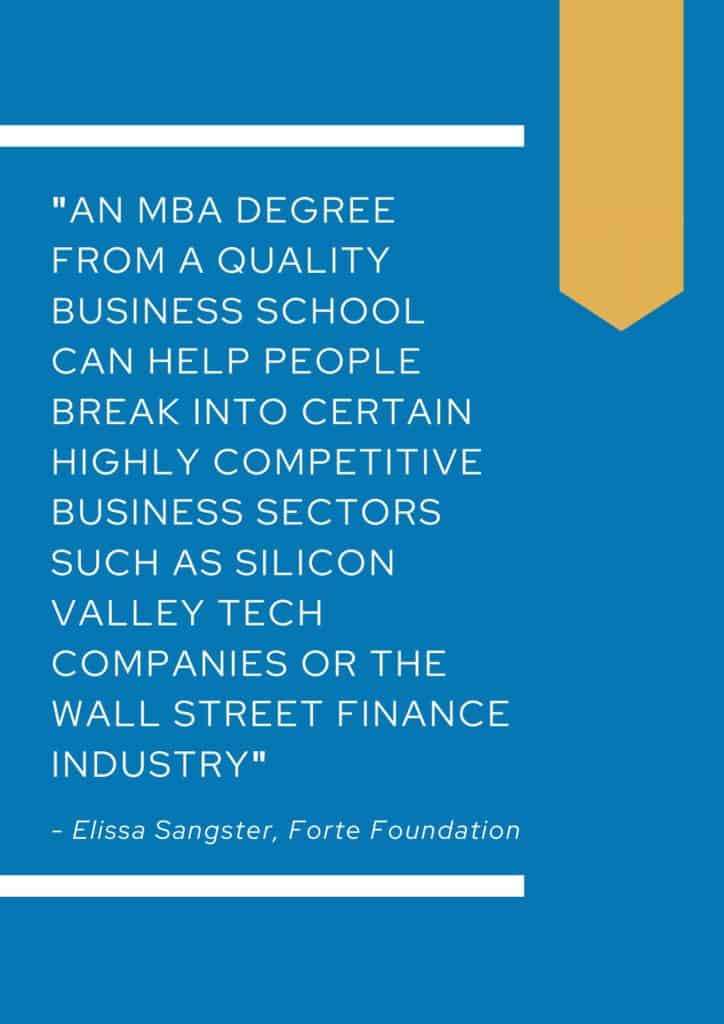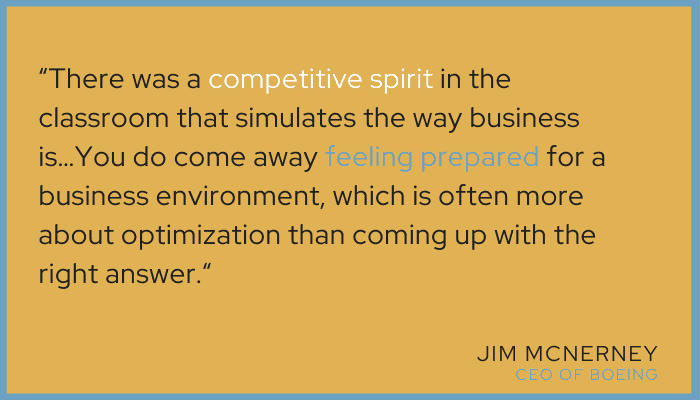
An Online Master of Business Administration (MBA) is your passport into the business world.
We live in a global society of interconnected businesses. In order to compete, or even be a part of the global world, you need business skills and practical know-how to communicate effectively, act decisively, and make business-savvy decisions.
There are lots of good reasons to get an online MBA. Whether you work for a corporation or own your own company, the MBA is the gold standard. Graduates with an online MBA in hand prove that they have completed a rigorous business program, and are ready to enter into the business world.
What is an MBA?
A Master of Business Administration, or MBA, is a master’s degree that prepares you to lead in a variety of roles in a company or organization. This MBA preparation includes a business core of classes in principles of leadership, finance, communication, accounting, law, and management. Subject areas are broad, ensuring that knowledge and skills are applicable in private, public, and non-profit organizations.
The general MBA can be criticized for not being specialized, and more often than not, graduate students end up choosing a concentration. Concentrations build on the general MBA core with courses in specific areas such as Strategic Management, Marketing Analytics, Supply Chain Management, Entrepreneurship, or Corporate Finance, just to name a few.
Essentially, an MBA shows that you are an educated member of the business world, and are ready for leadership within an organization.
What is an Online MBA?
An online MBA is an online masters degree program with the same curriculum, standards, courses, and most often professors, as traditional on-campus programs. In addition, online MBA programs are often faster than their on-campus counterparts due to asynchronous delivery and accelerated options.
One of the biggest benefits of online learning, students can conveniently work their own pace from the comfort of their own home. This means that the adult student has the option to continue working and/or maintain family obligations.
Working adult students can also claim a learning advantage, as most business knowledge is experiential, and the theoretical learning completed in the online MBA program takes on more meaning when it is related to real-world business situations.

What are some categories of MBAs?
General vs. Specialized
Most schools offer a general MBA that provides students with a broad base of business knowledge. Students will learn the basics and develop skills that can be applied to almost any job in the business world. A general MBA is a great option for those who are interested in a broad spectrum of business-related skills and jobs. Programs produce well-rounded graduates who have strong leadership, communication, and critical thinking skills and are ready to enter into any business-related profession.
A specialized MBA is for the graduate student who knows what field they want to go into, for example, finance, marketing, human resources, computer information systems, entrepreneurship, etc. Students who are already working for a company and want to move up may consider getting an online MBA with a particular concentration that will help them advance in their organization. Students who have a passion for one of these specialized fields should pursue a degree that aligns with their goals.
Full-time vs. Part-time
A full-time online MBA program can be completed in as little as two years. These programs are rigorous, and should only be attempted by students who are ready to put their nose to the grind and don’t have the distractions of family or a career. That’s not to say it can’t be done, but taking a full credit-load is a lot of time and responsibility. For those who are willing to accept the challenge, the reward is that after the two years of hard work and dedication, you will have an MBA in hand.
Part-time MBAs are a great option for students who are also working or have the demands of family life, or both. These programs, most often offered online, allow students to take only the amount of credits they feel they can handle at any particular time. Colleges have limits on how long one can take to finish the program, but there is ample time as long as one continues to make progress. Earning an MBA at a part-time pace helps relieve stress and allows working adults to pursue higher education while providing for themselves or a family.

Online vs. Hybrid vs. Traditional
An online MBA is offered online with all of the flexibility of an online degree. Students can complete their work from the comfort of their own home, a library, or a coffee shop. This is an excellent option for working adults who may only be able to study in the evenings or weekends. More and more universities are offering online degrees making it possible to earn an online MBA with the same accolades as their on-campus counterparts. Here are some of the best online MBA programs in the country.
Hybrid degrees are a combination of online and on-campus degrees. To be completely accurate, many “online degrees” are actually hybrid, meaning they have some sort of on-campus requirement. Programs often require at least one on-campus visit, whether it is a weekend seminar, a four-week course, or one evening a week. Each program is different, be sure to check the requirements for the programs are you are interested in. Hybrid degrees can be a great choice for the student who needs the flexibility of an online degree but is looking for some face to face contact and interaction. The connections and relationships built during these on-campus meetings can be invaluable.
Traditional MBAs are just that – the traditional model of education where a student completes their degree in a brick and mortar facility, face to face, with professors teaching classes, and physical attendance in a class is required. While online options are all the rave, there is much to be said about earning a traditional degree. The real, human connections that are made from seeing the same professor, in person, on a regular basis leads to a very meaningful connection. Students who have the time and money to pursue a traditional degree should consider this option.
Executive vs. Accelerated MBA
Executive MBAs are designed for mid- to senior-level management and most of the time require at least one on-campus visit. They are almost always offered on a part-time basis as it is assumed that the student is a working student and therefore must study at a slower pace. Admission into these programs is more difficult as most programs require that students in the Executive MBA program be working in the business field. Courses are designed to help enhance your current job performance and require real-world scenarios to accurately complete the degree. Check out our list of the top online executive MBA programs for more information.
An accelerated MBA degree is almost the opposite of an executive degree. An accelerated degree would be extremely difficult for the working adult, but it is a great option for the motivated student who doesn’t have work or family responsibilities. Accelerated MBA degrees are usually offered online and can be completed in as little as ten to fifteen months. They are a great way to save money and get out into the job field quickly. For more information about some of the fastest online MBA programs, check out this article.

What does an online MBA program look like?
There are now hundreds of excellent online MBA options to choose from. It doesn’t matter if you’re looking for a public or private, big or small school, there’s a program for you.
Online MBA programs typically range from 30 to 50 credits and include a capstone or research project for completion. If you’re looking for a specific concentration, most schools offer multiple options. Some online MBAs have on-campus visits listed as part of the program, so be aware of any travel you may need to complete. For example, there is sometimes a residency requirement during orientation, weekend seminars, or a summer internship required.
Each program is different. Admission requirements usually include a bachelor’s (some require this to be in business), a minimum GPA ranging anywhere from 2.0 to 3.0, and some require minimum work experience, and GMAT/GRE test scores, although many do not.
Once you are enrolled in the program, you can take anywhere from one all the way up to five courses per term or semester. Expect a lot of reading, note-taking, listening to lectures, and tests. Expect to work hard for several years, but the reward at the end will be great.
Why should I consider an MBA?
There are many reasons and factors that play into this answer. MBAs are intensive degrees that take ample effort in terms of time, money, and resources. It’s important to do your homework first to decide whether or not to take the plunge. We’ve scoured the net to help you consider an MBA from different perspectives.
Why not take a cue from business teachers, leaders, current MBA students, and alumni of MBA programs to decide if the MBA is for you?
Teachers:
Business school professors offer incredible advice and expertise at any level of the MBA process whether you’re at the beginning and just considering, or if you’re at the end and ready to interview. In general, professors of business emphasize the advantage that having a clear career focus brings. With this, you can consider the business school that provides the specific specialization or electives you’re looking for. Here are some testimonies and sagacious advice:
Dr. M. Eric Johnson, Vanderbilt University, says, “Top B-schools offer an amazing (and sometimes overwhelming) set of opportunities to network. Students should never miss a chance to share coffee or a lunch with a visiting executive. Even after a long day, stopping by for a reception can be career-changing.”
Dr. Timothy Baldwin, Indiana University, offers this advice to MBA students: “Find every opportunity to practice interpersonal and people-leadership skills and to actively seek critical feedback.”
Professor Baba Shiv, at Stanford, believes that MBAs can help improve brain chemistry that controls our decision making.
Business Leaders:

The reality is that many incredible CEOs and business leaders today earned an MBA at some point in their careers. This fact alone is telling to the effectiveness of an MBA. The proof is in the pudding!
Kenton Kivestu, the CEO and founder of RocketBlocks, a company that helps aspiring management consultants said he was “…interested in an MBA in general [because I wanted to build expertise across the different functions that I knew I would need experience in as a CEO.”
Elissa Sangster, CEO of the Forté Foundation, said “an MBA degree from a quality business school can help people break into certain highly competitive business sectors such as Silicon Valley tech companies or the Wall Street finance industry.”
Jim McNerney, CEO of Boeing, said, “There was a competitive spirit in the classroom that simulates the way business is…You do come away feeling prepared for a business environment, which is often more about optimization than coming up with the right answer.“
Students and Alumni:
What better way to consider an MBA than to see what alumni and students have said? What you’ll find in most studies of alumni is that they are satisfied with their degrees, feel the program was worth it, and believe they have improved as business leaders because of it.
One such report, based on an international study of alumni, shows many positive reasons to consider an MBA:
- 93% report they are better able to solve problems
- 85% said that the MBA had a positive impact on their happiness
- 81% said the MBA made them more likely “to make better business decisions.”
- 73% report they are more likely “to make my teams operate more efficiently.”
- 71% reported “I am more confident about myself.”
Here are a few testimonies from students and alumni:
“I’ve developed a wide knowledge in the business community,k the new trends, the inside information from a lot of entrepreneurs on how to make their business grow and expand as well as the start-up environment, innovation, and sustainable growth.”
“Most of all, I’ve benefited from meeting and learning from people who are more than one-dimensional, who have stories and ideas that contradict what one might expect, and who harbor great depth, curiosity, and kindness.”
“It taught me to think critically, challenged my beliefs, gave me confidence, and opened doors for me.”
“[The MBA] really gave me a good foundation for the transition from a technical background to the business world, and it prepared me well for that…things I learned in that program I apply every day as CEO.”
Still not convinced? Check out this article by Marco De Novellis for more.

Is the MBA still relevant today?
Though the debate today about MBAs is filled with competing voices, many experts believe the MBA is not only as relevant as the past, but more!
In a recent article in Bloomberg Businessweek this is illustrated. In the article, five deans from business schools of varying sizes and rankings sounded off.
Antonio Bernardo, dean of the UCLA Anderson School of Management said, “The skills you learn in an MBA are probably more valuable than they have ever been. Dartmouth’s Tuck School of Business Dean Matthew Slaughter related the continuing evolution of the MBA. The example he gave was at Tuck the old statistics course was scrapped and replaced by the more relevant data analytics course.
In fact, across the board you’ll find business schools adapting to all the technical disruptions. Another trusted source for opinions on all this is Forbes. In a recent article by Jeff Thompson, he reports that an MBA is still as relevant and encourages differentiation of certification as a way to increase marketability.
Worth a quick mention of this question is the alumni of business schools. According to The Graduate Management Admission Council (GMAC), which surveys alumni regularly, over 90 percent of respondents in the last few years attest to the value of their MBA.
Is an MBA worth it financially?
This is one of the best questions to answer in your search. The quick answer from a comprehensive viewpoint is that, yes, an MBA is worth it…depending.
There are too many factors for a one-size-fits-all answer. Suffice it to say, the location, program, your previous education or experience, and pace all substantially contribute to whether the MBA will be worth it. Many schools are scrapping their full-time traditional MBAs and going with hybrid or fully-online degrees due to cost.
With the advent of online education and the huge boost in light of the Covid-19 Pandemic, many MBAs can be completed for a more affordable price online. We cover the Online MBA extensively. Our research indicates that the Online MBA is the direction schools are going and that you should look into as well.
The Bloomberg article mentioned above features Brigitte Madrian, Marriott School of Business at Brigham Young University. BYU provides a more inexpensive option with students averaging $25,000 in debt as opposed to many other full-time MBAs that average around $100,000.
Even with a debt of $100K or over, the decade-long ROI can still be quite good. In fact, U.S. News reported that, “within 10 years of earning an MBA degree, the average MBA grad from either a U.S. or international business school had an estimated decade-long return on investment of $390,751.” Top schools such as Stanford have an ROI after a decade of over $1 million!

How do I determine if my MBA is worth it?
Since earning an MBA is a serious engagement that requires considerable effort, investment, and dedication this question ought to have a solid answer before proceeding. As seen above, an MBA is still relevant and worth it for many people. We break down the decision-making process into a few areas:
- Target Goals and Career Choice
- Finances and Quality of Life
- Schools, Programs, and Non-financials
Target Goals and Career Choice:
Let’s take your goals first. The path to your MBA and dream job starts before your MBA and dream job. Sounds stupid, but it’s often the step that’s skimmed over. It’s also one of the most common bits of advice MBA professors and experts give! We believe getting your goals straight and clear, especially if you can narrow down a specific area of specialization before you choose your MBA is truly wise. Check out this article on how to prepare for an MBA.
What career are you looking at? What are your short- and long-term goals? How will an MBA help you achieve them? Are you prepared for the change in your life that comes with taking on an MBA?
The reason they have been considered the gold-standard for employers is that an MBA graduate can communicate well, complete the task, and bring a broad knowledge of business administration skills to the table.
That takes effort and dedication! In general, if your goals are to found a company or enter management or leadership the MBA will be worth it. If not, you may want to reconsider. The next step to determine the worth is a look at financials and other costs, then onto the school and program with some non-financial factors tossed in.
Finances and Quality of Life:
We’ve already cracked open the financial egg in some answers above. This is definitely a key ingredient to determine if an MBA is worth it for you. The basic principle is the cost to benefit analysis. What will you put into the degree in terms of time and money? Those costs will impact your life. What are you willing and not willing to change?
If you go the traditional full-time MBA you may not be able to keep your current job. You can expect a demanding 2-3 years on average with a lot of debt, upwards of $100K. Program costs range considerably, but you can count on $30,000 or higher.
You can also count on a challenge regardless of online, tradition, hybrid, part- or full-time. How will these different types of MBAs affect your job? Some employers may have programs for you to help. Some may be interested in your development and encourage you to step up and into a new role with an MBA.
These are important factors to consider. Once you determine what best fits your life schedule it’s time to look at some programs and schools, and lastly, a few non-financials that may help tip the balance in your decision towards or away from a specific school or program.
Schools, Programs, and Other Factors:
If you know the specific program or certification you want to pursue, you are on top of your game. If you don’t, got back to your goals and revisit that aspect of your journey.
There are so many concentrations nowadays it is certainly worth it to know what you want and to narrow down your search. Not all business schools are created equal, and the alumni, network of professionals, and credentials, accreditation, and reputation can make a real difference.
An MBA from Stanford means something more than, say, an unrecognized state school. This reputation does cost more, but the ROI of business schools such as Stanford, Wharton (Pennsylvania) Johnson (Cornell), or Tuck (Dartmouth) pay off. Where you intend on working can also factor into your decision. A job in NYC or DC may pay more, but the cost of living is a factor.
The top salaries in the country based on location:
- New York $90,734
- Massachusetts $89,876
- Washington $89,249
- New Hampshire $87,470
- Hawaii $86,319
- Maryland $83,293
- Connecticut $83,267
- North Dakota $82,721
- Alaska $82,721
- Wyoming $82,721
The nation’s median average is $82,721.

What are some concentrations or Certifications that I should know about?
Specialization adds a lil’ something to your MBA. Earning a concentration or specialization with an MBA is becoming more common. Perhaps it’s the larger trend in our developed and advanced economy, but the fact is, there’s a reason. Concentrations give a competitive advantage, signal to employers specific skills and qualities can make your resume stand out, and can lead to higher pay.
Let’s start with what knowing what is the most popular. Not because an MBA is a popularity contest, but because there’s generally a reason why some degrees are more popular than others, and in this case, it’s rooted in supply and demand. It’s economics 101!
The Most Popular Concentrations:
- Finance
This MBA concentration is commonly sited as a “most popular” for good reason. The position within a company is vitally important. An MBA or Online MBA in Finance will set you up for advancement or leadership.
- International Business
The International Business concentration is growing due to globalization. Even with the recent political upheavals, the world’s economy is intricately tied together. Earning one of these, often with study abroad experience, will vault your resume to the top.
- Strategy
Anyone who thinks they can understand all the complexities of the market is mistaken. However, this MBA concentration can help unlock some of those complex relationships to help companies grow, invest, or change. This skill is highly sought after.
- Entrepreneurship
This concentration, of course, helps understand how to start a business, which is amazing in terms of potential earnings. It also helps land jobs in management or leadership as the skills learned are invaluable for risk-management, securing funding, and strategic operations.
- Information Technology/IT Management
Data and information are perhaps the most valuable resource in the world. Yes, we need water to survive, but businesses need to understand data more and more every day. This demand to manage information is extremely important for companies today.
- Operational Management
The name of the game with this MBA concentration is planning, organizing, and managing a company’s operations to maximize profit and efficiency.
- General Management
The MBA in General Management remains a mainstay for popular concentrations. The fact is, when you have the training to do management well you can help any business. Skills such as communication, problem-solving, team building, and more make this concentration worth considering.
- Consulting
The specialization in Consulting is not only in demand, but it can also be lucrative. Businesses competing in our global economy want the advantage and they will pay to figure it out. They want to increase profits, reduce costs, and expand market share and that is where this specialization shines.
- Marketing
If you love communication, persuasion, and promotion this concentration is for you. The MBA in Marketing puts you on the front lines of a business with the skills to plan, manage, and analyze marketing, advertising, and leadership.
- Accounting
The “numbers” person is indispensable for any company big or small in every area of the economy. To earn a concentration in Accounting prepares you to maintain and manage numbers with accuracy.
- Innovation
Innovation to a company is like breathing to human life, without it, death will result. An MBA in Innovation places you in an advantageous place. Employers will see your specialization and understand that you have the critical thinking skills and creativity to promote, enhance, and manage, innovation.
- Healthcare Management
A specialization in Healthcare Management assures your marketability. Hospitals and health care facilities need good business managers to succeed. They need to be able to hire a manager who can navigate through the complexities of insurance, regulation, and gov’t oversight, as well as all the other aspects of the business side of healthcare.
- Corporate Social Responsibility (CSR)
This MBA concentration is a more recent addition to the growing number of specializations colleges offer. The CSR focuses on how a company impacts society. With an MBA in CSR in your hand, you will be able to help a company with economic and environmental sustainability, responsible supply chains, workplace inclusion, and stakeholder relationships.
- Business Analytics
Business Analytics is a fast-growing field and in high demand. The concentration focuses on the collection, management, and analysis of data for a company. This ability is key in our information-saturated world to understand every facet of a business. This specialization is not going out-of-style for a long time.
Now that you know what the market is demanding, here are the highest paying concentrations.
Highest Paying MBA Concentrations:
Though it would be nice to have exact numbers across the board, the reality is there are many variables and sources that make finding one number completely accurate. For example, a salary in New York City for the same job in Nashville is different. And to complicate matters, job titles and degree names vary, and different sources record and divide their data differently.
Also, the Bureau of Labor and Statistics and, say, Payscale, report early, mid, and late-career salaries that have variable range differences. On top of that, to really understand compensation requires knowledge of base pay, bonuses, and relocation.
All that being said, do your homework, and if possible know the ins and outs of the specific job and list of companies you’d like to work for. But….disclaimers aside, these concentrations tend to pay the most:
- Finance
- General & Strategic Management
- Operations Management
- Information Systems/Technology Management
- Marketing
- Innovation Management
- Entrepreneurship
What are some jobs can I get with an online MBA?
An online MBA essentially prepares you for business management in an organization or company. There is a wide spectrum of jobs available with this versatile masters degree. The traditional core required in an MBA program includes fundamental theory and skills in accounting, data analytics, finance, marketing, and organizational leadership.
These courses and training prepare graduates for management positions in nonprofit, public, and private organizations. Not only does an online MBA prepare you to apply for open positions, but graduates also have new skills to offer at their current jobs, placing them in a position for a promotion. Let’s explore potential career options:
Human Resources Manager:
Human resources managers are essentially the hiring and training center in an organization. They oversee employee relations, manage compliance, and oversee payroll and benefits as well as training. They work alongside the top executives in the company to assess the organization’s planning and employee management issues.
They are constantly evaluating ways to maximize the efficiency and value of the employees. Visit our list of the best online MBA in Human Resources for the top programs in the nation.
Average median salary in 2019: $116,720
Predicted job outlook over the next ten years: 7%
Financial Analyst:
Financial analysts, or also known as securities analysts or investment analysts, evaluate investment opportunities. These analysts can be found all over the business world in banks, securities firms, insurance companies, and almost any business. Financial analysts are also called securities analysts or investment analysts. For further information about online MBA programs in finance, check out this list.
Average median salary in 2019: $85,660
Predicted job outlook over the next ten years: 6%
Accountant and/or Auditor:
Every company needs someone to make sure that their financial records are accurate. Auditors and accountants keep financial records and make sure they are always detailed, up to date, and most importantly, correct. They are also in charge of paying the company’s taxes. Accountants and auditors are a crucial part of any organization, from small businesses to the largest company. Some of the best online MBA programs in Accounting can be found here.
Average median salary in 2019: $71,550
Predicted job outlook over the next ten years: 6%
Marketing Manager:
A marketing manager constantly evaluates the market demand for products and/or services that a company offers and compares it with its competitors. They search for potential markets and develop pricing strategies to increase both profit and customer satisfaction.
Marketing managers work with other people in sales, product development staff, and public relations. They must constantly monitor trends and adjust the sales strategies accordingly. Some of the top online Marketing MBAs can be found here.
Average median salary in 2019: $135,900
Predicted job outlook over the next ten years: 8%
Personal Financial Advisor:
Personal financial advisors work with individuals to assess their financial needs and help them make decisions regarding their investments, budgets, insurance, and all pertinent financial decisions. They help their clients set both short- and long-term goals and help their clients make prudent investments. They walk with their clients through all parts of life, from when they are starting off and planning for retirement thirty years down the road, to managing family finances, and then helping retirees maximize their savings.
Average median salary in 2019: $87,850
Predicted job outlook over the next ten years: 7%
Healthcare Administrator:
One of the fastest-growing occupations on the list, healthcare administrators plan, guide, and operate the business side of medical and health services. Essentially, they are the managers – from an entire facility to a specific clinical department or a small medical practice.
Healthcare administrators must constantly adapt to changes in healthcare laws and regulations as well as the latest technologies. Here are some of the best online Healthcare MBA programs to get you started.
Average median salary in 2019: $100,980
Predicted job outlook over the next ten years: 18%
Computer and Informations Systems Managers:
Often referred to as information technology managers, computer and information systems managers plan, organize, and direct the technical aspects involved in running a company. They evaluate the needs and goals within an organization and determine the best information system to meet the company’s goals. There are many hats that these managers wear, and in larger companies, there are often several specialists working in a variety of specific areas from IT Security Managers to Chief Technology Officers. For further information and a list of top online MBA programs in Information Technology, visit this link.
Average median salary in 2019: $146,360
Predicted job outlook over the next ten years: 11%
Supply Chain Management:
Ever wonder where a product comes from? Supply chain managers are at the heart of getting products from the manufacturer to the consumer. They analyze and coordinate a company’s supply chain. Essentially, they oversee and move along the life cycle of a product from how it is acquired, distributed, and delivered.
This involves purchasing, transporting, managing inventory, and storing the product. Supply chain managers are crucial to an organization. Visit this link for a list of the best online MBA programs in supply chain management.
Average median salary in 2019: $74,750
Predicted job outlook over the next ten years: 5%
Operations Research Analyst:
When you look at the 26% projected job growth of an Operations Research Analyst, you may want to seriously consider this career. These specialists are involved in every aspect of an organization from developing production schedules, deciding how to allocate resources, managing the supply chain, and setting prices. First, they identify and understand any potential or actual problem or the process that needs improvement, collect relevant data, and decide on the best course of action. Often, they use computer software and databases to help solve problems. Find the best online MBA program for Operations Research Analysts here.
Average median salary in 2019: $84,810
Predicted job outlook over the next ten years: 26%
Top Executive:
Top Executives are those people at the top of an organization who are essentially running the show. They develop strategies and policies, plan, direct, and coordinate an organization. While the level of responsibilities differs greatly depending on the size of an organization, those aspiring to be an executive need to be ready for the responsibility.
Those working in small organizations will have more day to day responsibilities such as, hiring, training, purchasing, quality control, and supervising. In larger organizations top executives focus more on developing policies, planning, overseeing the general managers.
Average median salary in 2019: $107,690
Predicted job outlook over the next ten years: 6%
What is the job outlook for those with an Online MBA?
Graduates with an MBA in hand are in high demand in this competitive job market. Employment opportunities for graduates of MBA programs are expected to grow 9.2 percent over the next decade and 86 percent of companies across the globe reported plans to hire recent MBA graduates in 2017. According to the Graduate Management Admission Council (GMAC), three in four start-up companies plan to hire employees with an MBA and more than half of employers plan to increase salaries of MBAs at or above the inflation rate. Business graduates with MBAs earn more than those without.
How much money will I earn with an MBA?
There is a broad spectrum of salaries for those with an MBA in hand, and there are several factors that come into play. Unfortunately, gender is still a factor, and typically, males earn an average salary of $93,000 annually compared to their female counterparts who earn $75,000 annually. Other factors include the state you work in and any specializations you have.
According to Payscale, the average salary of an MBA graduate is $88,000, and four out of five graduates reported being highly satisfied with their job. Payscale also lists Financial Analysts on the lower end of the scale with an average annual salary of $63,905, and a CFO on the high end with an average annual salary of $149,793. Overall, earning an online MBA provides outstanding opportunities for both personally satisfying and high-paying jobs.
What does the MBA admission process include?
Leave no doubt about it, the admissions process for online MBA programs is a lot of work. Colleges and universities only admit qualified students to their programs, and applicants are vetted through prerequisite requirements before even submitting admissions materials.
Admission to online programs is slightly less involved than their on-campus counterparts. Because learning online is more relaxed than attending an on-campus program, online admissions officers are often more selective in their choice of candidates. They want to ensure that the students they allow into their programs are going to work without the accountability of face to face interaction. Online students need to be ready to complete challenging, in-depth coursework at their own pace.
Admissions officers look at test scores, GPAs, resumes, letters of recommendation, undergraduate transcripts, and the overall application to determine if students are ready for a rigorous program. Most often, admission requirements include the following:
Prerequisites:
- Bachelors Degree: There is no getting around it, in order to be admitted to an MBA program, you must have a bachelors degree in hand. Schools vary about whether the undergraduate degree must be in business, some require a business degree, while others do not.
- Minimum GPA: Most programs require an undergraduate degree of at least 3.0, some may require a minimum GPA of 3.5 to be considered for admission.
- Professional Experience: While this prerequisite varies from program to program, most schools want their MBA students to have some form of professional work experience. Some require that this experience is in business, while others just want to see their potential students have spent some time in the workforce.
Admission Materials:
- Application: Not a huge time commitment, applications ask for all of your basic information. Most schools ask for the same types of information – name, address, prior schools attended, etc. CommonApp is a great tool that can be used to apply to several programs.
- Application Fee: Usually anywhere from $50 to $100, this shows schools that you have skin the game and pays them for their time of processing your application.
- Letters of Recommendation: A general part of the application process, schools want to hear what others have to say about you. Usually, they ask for anywhere from two to five letters and should be written by a teacher, employer, or someone who knows you professionally. Letters from mom don’t count!
- Transcripts: Most programs are going to require a transcript, possibly from both your high school and undergraduate degree. They may require these to be “official,” meaning they are sealed by the school and mailed directly to the institution.
- Test Scores: Many institutions require a minimum GMAT or GRE score to be considered for an MBA program. Obtaining these scores is a process that takes a considerable amount of time, and it is good to start working on taking the test up to six months before the application process.
Should I take the GMAT?
Students who are serious about business school should take the GMAT exam, without a question. Offering a GMAT score shows schools that you are serious about your business degree. It is also a proven indicator of your ability to succeed.
Taking the GMAT measures your critical thinking skills, demonstrates your commitment, motivation, and ability to succeed in business school, increases your earning potential, and helps your school of choice make informed admission decisions. It can also help lead to scholarship opportunities.
10 Facts About the GMAT Exam
- Highest GMAT Score: 800
- Average GMAT Score: 556
- Time to take GMAT: 3 hours, 30 minutes
- Cost of GMAT Exam: $250
- When you can take GMAT: Any day, all year long, except for holidays
- Sections of GMAT: Quantitative, Analytic Writing, Verbal
- 200,000 candidates take the GMAT each year
- There are 650 testing centers in 114 countries
- It is the most widely used exams for MBA admission
- 7,000 programs use the GMAT
How do I prepare for the GMAT?
- Start the process at least six months before you need your test results. The majority of test-takers say it takes a minimum of eight solid weeks to study.
- Review your basic math skills, even if you think you know them. Math is crucial!
- Review and study only one section of the test at a time.
- Go over the different types of questions in the Analytical Writing Assessment, Integrated Reasoning, Verbal, and Quantitative Reasoning sections.
- Practice pacing yourself. Time management is a crucial component of completing the GMAT.
- Check out the free GMAT™ Official Practice Starter Kit and Exams 1 & 2. This provides practice with the format used in the exam and includes two free practice GMAT exams.
- Also check out the GMAT™ Official Practice Exams 3, 4, 5 & 6.
- Review using the GMAT™ Official Guide Verbal Review or the GMAT™ Official Guide Quantitative Review.
- Here are some more practice tools: GMAT Write™, IR Prep Tool, and GMAT Focus™.
- Getting the drift? Practice, review, study, repeat. You can’t prepare enough.

Are there scholarships for MBA students?
The good news is, for those who are willing to search and put in the time, there are ample scholarship opportunities. Scholarships are available for students in all walks of life – from single parents to minorities, to those living in various localities, scholarship opportunities abound. Don’t walk away from money. Often, students, especially at the graduate level, think that there isn’t help for them. Here are some scholarships worth looking into if you are pursuing an online MBA:
- The Paul & Daisy Soros Fellowships for New Americans: This is a merit-based fellowship offered to graduate students and is exclusively for immigrants and children of immigrants. There are more than 2,200 applications put in annually for 30 awards, but those who are chosen could receive up to $90,000 to pay for their graduate degree. For more information, visit this link.
- The Forté Fellows Program: This program was created to increase the number of women enrolling in MBA programs. They offer fellowships to women pursuing an MBA education at a partner business school. Currently, schools have given $226 million to almost 10,000 Forté Fellows. To be considered for a fellowship, you must apply to a participating school.
- The Consortium: This organization has been offering merit-based fellowships since 1966. Available for MBA students, their fellowships cover full tuition and fees for up to two years of full-time study. As of today, The Consortium has offered more than $465 million in fellowships. Visit their page for more information.
Check out some of our other lists of scholarships:
- 50 Biggest College Scholarships
- Best Scholarships for Online Students
- 20 Scholarships for Students with Learning Disabilities
- Biggest College Scholarships
- Biggest Scholarships for Women
- Biggest Scholarships for LGBTQ Students
- Biggest Scholarships for Black and African-American Students
- Biggest Scholarships for Latino and Hispanic Students
- 10 Scholarships for Students on the Autism Spectrum

What professional organizations should I know about?
Entering into the professional world involves more than just earning a degree. It means networking, establishing a reputation, and being involved with organizations that provide ongoing training and resources. The time to start is now, while you are an MBA student.
These organizations offer events, seminars, resources, and numerous opportunities for networking, and most importantly, connections that could lead to a future career. Here are some professional organizations you should consider as an MBA student:
- American Management Association: An invaluable resource, the American Management Association provides everything you need to enter into the business world. They offer web events, online training, seminars, leadership training, podcasts, corporate solutions, certification programs, and other resources to professionals in management roles.
- Association of MBAs: A great organization to begin with while you are earning your MBA, the Association of MBAs has been known as the impartial authority on postgraduate management education for over 50 years. It was founded in 1967 and committed to raising the standards of business education around the world. AMBA offers accreditation services, professional training, and relevant research and insight into the business world.
- DECA: For over 75 years, DECA has influenced the lives of nearly ten million students, from high school students all the way up to business professionals. The organization hosts programs and seminars to conduct research by using the latest technology. There are more than 225,000 current members, and 300 collegiate chapters, DECA’s influence is widespread.
- Entrepreneurs Organization: A global business network for over 14,000 entrepreneurs, the Entrepreneurs Organization offers 196 chapters in 62 countries. It is the only peer-to-peer network in the world that is solely for entrepreneurs. It was founded in 1987 by a group of young entrepreneurs, with the goal of offering a platform for business owners to network, leading to greater success as well as enriched relationships.
- The National Association of Sales Professionals: A professional organization for those in sales, the National Association of Sales Professionals is for members who desire to be distinguished leaders in the sales field. They are committed to helping their members advance their sales careers and improve their financial security.
- American Marketing Association: Known as “the essential community for marketers,” the American Marketing Association is a professional organization specifically for those in marketing. The goal of the organization is to lead an ongoing discussion on marketing excellence through content that “focuses on the tension between Best Versus Next Practices™.”
What professional news sources should I be plugged into?
- MIT Technology Review: An academic powerhouse, MIT offers free content regarding the latest technology used in business.
- Google Scholar: A free yet powerful resource, Google Scholar provides academic resources for your research.
- Business and Economics Journal: An open-source, free journal, Business and Economics Journal offers access to free research and publications regarding the latest economic, financial, and business trends.
- Financial Times: One of the world’s largest international newspapers, the Financial Times focuses on business, economics, and finance.
- Fortune: Fortune is the leading publication for American-based businesses. Check out their website for excellent but free content, including videos, articles, and business conferences.
- The Economist: A respected journal, The Economist provides authoritative reporting about the world’s most important economic and business news.
- Harvard Business Review: With free articles, videos, webinars, and more, Harvard Business Review is one of the world’s leading resources for business research and news. Subscribers will have access to a plethora of news and other resources.
- Forbes: A staple for those in business, Forbes offers daily insights with a focus on personal finance, technology, and relevant news stories.
- Scientific Research: Scientific Research offers free access to a vast amount of peer-reviewed research and articles. They also offer an app that is extremely useful.
For more helpful articles regarding your online MBA, check out these resources:
- Best Online MBA Programs for Engineers
- Best Online MBA Programs for International Students
- Best Christian Online MBA Programs
- Best Online MBA Programs for Non-Business Majors
- How to Build Your Own Free Online MBA
- Best Online MBA Programs for Physicians
- Best Online MBA Programs for Military
- Best Online MBA Programs by State
- Choosing an Online MBA Program
- Fastest Online MBA Programs
- Best No-GMAT Online MBA Programs
- Best Value Online MBA Programs
- Most Affordable Online MBA Programs
Are there online MBA programs for small business owners?
The heart of America is in its small businesses. For those who own their own business or are looking to start their own business, there is a variety of online MBAs that will help you start a business or take an existing one to the next level.
Not only would the MBA degree be extremely beneficial, but there are multiple concentrations, from sports management to manufacturing, that fit different sectors of the economy.
MBA graduates come away with a broad knowledge base coupled with widely-applicable business skills. Courses in accounting, business ethics, finance, operational management, marketing, and business law will benefit any small business owner.
In addition to this core knowledge and practice, MBA programs give students the skills necessary to succeed in today’s fast-paced economy, namely, decision-making, leadership, and communication. While it should be noted that an online MBA is not strictly required to start a business, it will give any small business owner a definite edge.
In addition to the knowledge and skills graduates will have the opportunity to connect with current professionals, gain a valuable alumni network, and perhaps the most important – confidence in yourself.
Related:
Best GMAT Prep Courses Online
Fastest Online MBA Programs
Best EMBA Programs
Best 1-Year Online MBA Programs
